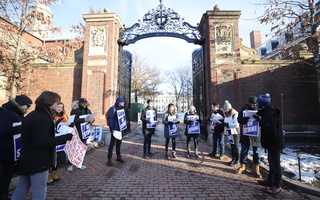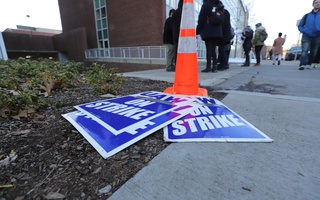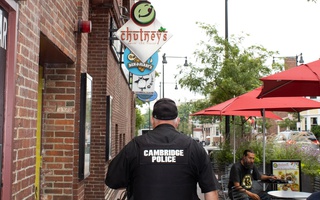{shortcode-d0c91b1e155d94a0a6b1c820886a54d1c6174099}
Twenty-two Harvard alumni who currently serve in the United States House of Representatives sent a letter to University President Lawrence S. Bacow last week declaring their support for the Harvard Graduate Students Union-United Automobile Workers strike.
The letter — organized by Representative Andrew S. “Andy” Levin (D-Mich.) — addressed the failure of the University and members of HGSU-UAW to reach a contract after collectively bargaining for over a year. The union began its strike Dec. 3, citing three key contract provisions that the two sides have failed to agree upon during that one-year period — compensation, health care, and a third-party grievence procedures to adjudicate claims of harrassment and discrimination.
The representatives wrote in the letter that they stand in solidarity with student workers on strike, citing their “fundamental human right” to unionize and collectively bargain.
“We are pleased that Harvard has indicated its intention to honor the right for graduate employees to organize and bargain,” the letter reads. “However, if workers who organize cannot achieve a first contract expeditiously, they have rights on paper but not in their actual working lives.”
University spokesperson Jason A. Newton confirmed in an email that Bacow received the letter Dec. 20 and has not yet responded.
Levin, who graduated from Harvard Law School in 1994, said in an interview that employers’ refusal to recognize unions, resulting in the two parties failing to reach a first contract, is “one of the biggest problems with workers’ rights in America.”
“There's really no other country where that happens,” Levin said. “You can't say a country has a system of respecting workers’ rights if, to form a union – if when they form a union – they can't even get a contract.”
The representatives also wrote that they were “concerned” that there has been “relatively little bargaining” between the University and HGSU-UAW over the course of the strike.
Since student workers first took to the picket lines, Harvard and the graduate student union have only met for one three-hour-long bargaining session. In that meeting, they reached six new contract provisions but failed to reach agreements on key issues such as compensation and health care.
“We urge Harvard and the union to negotiate much, much more intensively and to enter mediation immediately if you cannot achieve a first contract on your own,” the letter reads.
The day before Bacow received the letter, the University suggested engaging federal mediators to facilitate collective bargaining with the union. In an email to University affiliates, Provost Alan M. Garber ’76 proposed using the Federal Mediation and Conciliation Services to move past impasses in negotiations.
“We believe that the parties would now be best served by utilizing the services of a mediator to help us resolve remaining issues,” Garber wrote. “It is common to have a mediator help the parties move forward after exhaustive efforts at the table have fallen short.”
HGSU-UAW has agreed to mediation, and the first bargaining session with the mediator is scheduled for Jan. 7.
Levin said that when he talked to both the University and HGSU-UAW, he “didn’t see any unique issues or reasons” that explain why the two parties have not reached a contract, except for the lack of collective bargaining time.
“The truth is they just haven't spent very many hours at the table. Normally, if both sides are serious about reaching a contract, you go into you know, marathon bargaining or around-the-clock bargaining,” Levin said. “I just don't think that's happened here for whatever reason.”
“I think they need to get to it, get it done,” he added.
Levin said that though federal mediation can be helpful sometimes, it does not necessarily resolve disagreements in every case. All 22 representatives who signed the letter have co-sponsored the Protecting the Right to Organize – or PRO – Act, which attempts to expedite collective bargaining between employers and unions.
“[The PRO Act] provides for binding arbitration if parties cannot otherwise agree on a contract within four months – so that a first contract is achieved in less than six months in every case,” the letter reads.
Levin said his understanding of the HGSU-UAW strike has been enhanced by his son Saul F. Levin, a student at the Graduate School of Design who Levin said works as a teaching assistant and is a member of the union.
“I actually was on campus just earlier this week visiting him and his roommates and his friends and hearing from not just him, but other people who are in the bargaining unit about their experience of this,” Levin said. “It sort of reinforces to me the idea that this is a case where I'm confident that the parties can come to an agreement that respects the graduate employees’ rights, and they just have to put their minds to it.”
—Staff writer Davit Antonyan can be reached at davit.antonyan@thecrimson.com.
—Staff writer Callia A. Chuang can be reached at callia.chuang@thecrimson.com. Follow her on Twitter at @calliaachuang.
Read more in News
Post-Tenure Denial Backlash, 'Ethnic Studies Rise' Initiative Lauds Professor García Peña















